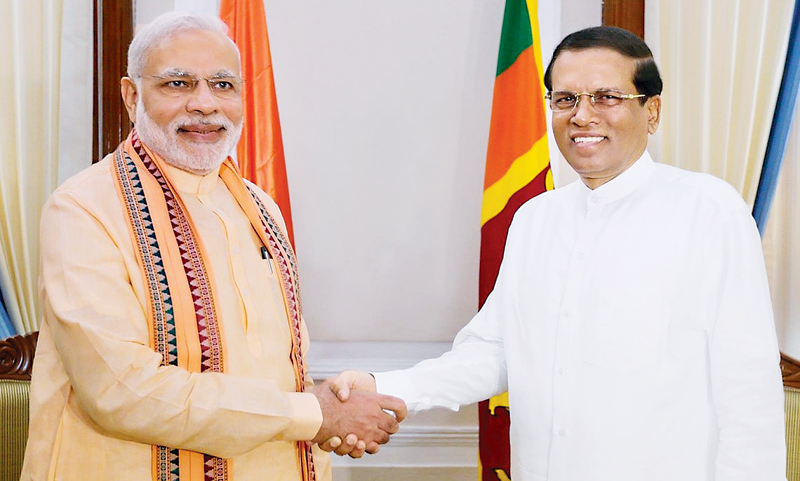It is reported that India has invited a multi-party parliamentary delegation from Sri Lanka for a familiarization tour and also to discuss mutual matters. This step taken by the Indian Government, led by Prime Minister Narendra Modi, should be regarded as a step taken in the right direction taking into consideration the inter-connected bilateral social and political problems faced by the two countries. India is our immediate neighbour and its representatives had come here to help us on various critical occasions in the history of our island, when our island state was threatened by use of arms by our misguided youth in recent history.
A well equipped battalion of Indian Armed Forces were here in 1971 at the invitation of the Sri Lankan government ready to help the country at large when an insurrection took place under the initiative of the Janatha Vimukthi Peramuna. This insurrection was targeted at toppling the coalition government that was elected by the people, with the backing of the working class movement, organised trade union movement and also by the peasantry.
Lal Bahadur Shashtri, the then Indian Prime Minister who maintained fraternal relations with Sri Lanka, absorbed 5,20,000 of estate labour as citizens of India. Later, Kachchativu also came as a donation to Sri Lanka.
IPKF
Then came the second insurrection, which developed into a large scale war in South East Asia well organised and launched by the LTTE, and also cooperated by various foreign elements. However, during a critical stage of the war, at the invitation of the Sri Lankan government the IPKF came here, on the orders of Rajiv Gandhi, the then Prime Minister of India. It should be noted here with gratitude that thousands of Indian soldiers sacrificed their valuable lives to safeguard the territorial integrity and sovereignty of Mother Sri Lanka. As a result of this generosity, India lost a precious life, that of Rajiv Gandhi, the grandson of epoch-making Jawarharlal Nehru and son of magnificent Indira Gandhi.
Whatever the tragic instances of the past and unwise attitude taken by some of the South Indian politicians, New Delhi and Colombo have maintained friendly relations right throughout. Even the Leftist leaders of our country, who were followed by the British secret agents during the World War II, preferred India to safeguard their own lives. The revolutionary Indian comrades looked after them very well.
The illustrious Foreign Secretary of India, Romesh Bhandari advised New Delhi throughout his diplomatic career to look into the problems of Sri Lanka, from a point of view of New Delhi and not to be a partner of other sinister objectives that would harm the interests of its immediate neighbour.
Under the leadership of former President Mahinda Rajapaksa and the war efforts coordinated by his commanders plus active support extended by international players, including India, Sri Lanka was able to eradicate the LTTE terrorism. It is the considered view of some war experts that the elimination of the LTTE terrorism has benefitted India in the long-run.
Traditional relationships
In this positive background, the series of meetings that will be taking place in Delhi between Sri Lankan and Indian leaders from September 9 to 14 will open the door to discuss several mutual and regional matters, including bilateral trade agreements, problems within the SAARC region, suggested defence agreements, strategic engagements with other foreign powers, proposed new constitution for Sri Lanka, problems arising from the 13th Amendment, homegrown solution for Sri Lanka and so forth.
The vast and rich experience possessed by the two countries over the last seven to eight decades in handling various issues of this nature, should help both parties to find workable solutions, safeguarding the traditional relationships and fraternity of both countries.
I would like to end this essay, with the lucid statement made by, Shivshankar Menon, the former Indian Foreign Secretary in his well-illustrated thesis, Choices Inside the Making of India’s Foreign Policy: But no matter what one might think of its internal politics, Sri Lanka today is a better place without the LTTE and the civil war. And India contributed to making that outcome possible.



Add new comment